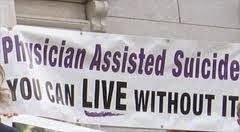 |
| John Kelly |
The media is flush with the sympathetic story of Brittany Maynard, the 29-year-old newlywed with aggressive brain cancer. Her video advocating expanded assisted suicide laws has been seen millions of times, prompting another push in the State Assembly to pass an assisted suicide bill.
When the focus is on an individual, assisted suicide can sound good – who’s against compassion or relieving suffering? But a closer look reveals that assisted suicide puts vulnerable people in mortal danger. The more people learn about the real-world implications of these bills, the more they oppose them. (Our group takes its name – Second Thoughts – from this fact). Last year, the Legislatures of New Hampshire, Massachusetts and Connecticut rejected assisted suicide bills.
The simple truth is that not all families are loving. Elder abuse is a nationally recognized epidemic. Every year, New Jersey elders suffer an estimated 175,000 cases of reported and unreported abuse, most by adult children and caregivers. Financial gain or emotional relief creates motives for steering someone toward death. The two witnesses to the death request could be an heir and the heir’s accomplice. Once the lethal prescription leaves the pharmacy, there is no further supervision and no independent witness required at the death to ensure that the lethal dose is self-administered.
Depressed people will be harmed. Under Oregon’s program, Michael Freeland obtained a lethal prescription for his terminal diagnosis, despite a 43-year history of severe depression, suicide attempts and paranoia. The prescribing doctor said a psychological consult was not “necessary.” When Freeland received volunteer suicide prevention services, he was able to reconcile with his estranged daughter and lived two years post-diagnosis. Oregon’s statistics for the last four years show that only 2 percent of patients are being referred for psychological evaluations.
When the focus is on an individual, assisted suicide can sound good – who’s against compassion or relieving suffering? But a closer look reveals that assisted suicide puts vulnerable people in mortal danger. The more people learn about the real-world implications of these bills, the more they oppose them. (Our group takes its name – Second Thoughts – from this fact). Last year, the Legislatures of New Hampshire, Massachusetts and Connecticut rejected assisted suicide bills.
The simple truth is that not all families are loving. Elder abuse is a nationally recognized epidemic. Every year, New Jersey elders suffer an estimated 175,000 cases of reported and unreported abuse, most by adult children and caregivers. Financial gain or emotional relief creates motives for steering someone toward death. The two witnesses to the death request could be an heir and the heir’s accomplice. Once the lethal prescription leaves the pharmacy, there is no further supervision and no independent witness required at the death to ensure that the lethal dose is self-administered.
Depressed people will be harmed. Under Oregon’s program, Michael Freeland obtained a lethal prescription for his terminal diagnosis, despite a 43-year history of severe depression, suicide attempts and paranoia. The prescribing doctor said a psychological consult was not “necessary.” When Freeland received volunteer suicide prevention services, he was able to reconcile with his estranged daughter and lived two years post-diagnosis. Oregon’s statistics for the last four years show that only 2 percent of patients are being referred for psychological evaluations.

























